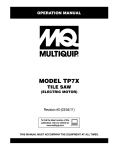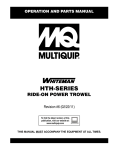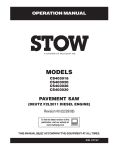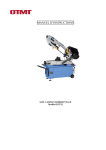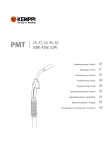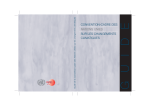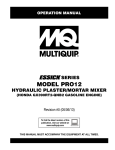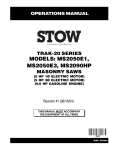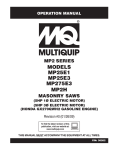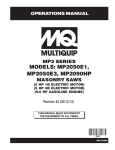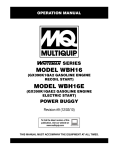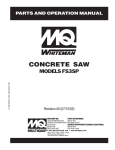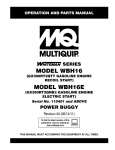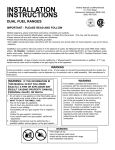Download Multiquip Saw TP24X User's Manual
Transcript
Operation and parts Manual MODEL TP24X Tile Saw (Electric Motor) Revision #2 (04/12/12) To find the latest revision of this publication, visit our website at: www.multiquip.com THIS MANUAL MUST ACCOMPANY THE EQUIPMENT AT ALL TIMES. Proposition 65 Warning Engine exhaust and some of its constituents, and some dust created by power sanding, sawing, grinding, drillingandotherconstructionactivities contains chemicals known to the State of California to cause cancer, birth defects and other reproductive harm. Some examples of these chemicals are: Leadfromlead-basedpaints. Crystalline silicafrombricks. Cementandothermasonryproducts. Arsenicandchromiumfromchemically treatedlumber. Your risk from these exposures varies, depending on how often you do this type of work. To reduce your exposure to these chemicals: ALWAYS work in a well ventilated area, and work with approved safety equipment, such as dust masks that are specially designed to filter out microscopic particles. page 2 — TP24X TILE SAW • operation and parts manual — rev. #2 (04/12/12) Silicosis/Respiratory Warnings WARNING WARNING SILICOSIS WARNING RESPIRATORY HAZARDS Grinding/cutting/drilling of masonry, concrete, metal and other materials with silica in their composition may give off dust or mists containing crystalline silica. Silica is a basic component of sand, quartz, brick clay, granite and numerous other minerals and rocks. Repeated and/or substantial inhalation of airborne crystalline silica can cause serious or fatal respiratory diseases, including silicosis. In addition, California and some other authorities have listed respirable crystalline silica as a substance known to cause cancer. When cutting such materials, always follow the respiratory precautions mentioned above. Grinding/cutting/drilling of masonry, concrete, metal and other materials can generate dust, mists and fumes containing chemicals known to cause serious or fatal injury or illness, such as respiratory disease, cancer, birth defects or other reproductive harm. If you are unfamiliar with the risks associated with the particular process and/or material being cut or the composition of the tool being used, review the material safety data sheet and/or consult your employer, the material manufacturer/supplier, governmental agencies such as OSHA and NIOSH and other sources on hazardous materials. California and some other authorities, for instance, have published lists of substances known to cause cancer, reproductive toxicity, or other harmful effects. Control dust, mist and fumes at the source where possible. In this regard use good work practices and follow the recommendations of the manufacturers or suppliers, OSHA/NIOSH, and occupational and trade associations. Water should be used for dust suppression when wet cutting is feasible. When the hazards from inhalation of dust, mists and fumes cannot be eliminated, the operator and any bystanders should always wear a respirator approved by NIOSH/MSHA for the materials being used. TP24X TILE SAW • operation and parts manual — rev. #2 (04/12/12) — page 3 Table of Contents TP24X Tile Saw Proposition 65 Warning............................................ 2 Silicosis/Respiratory Warnings................................. 3 Table Of Contents..................................................... 4 Parts Ordering Procedures....................................... 5 Safety Information................................................. 6-9 Specifications......................................................... 10 Dimensions............................................................. 11 General Information................................................ 12 Saw Components.............................................. 14-15 Electric Motor Components.................................... 16 Set-Up............................................................... 16-20 Sawing Guides.................................................. 20-21 Operation........................................................... 22-23 Maintenance...................................................... 24-30 Wiring Diagram (Electric Motor)............................. 31 Troubleshooting (Blade).......................................... 32 Troubleshooting (Saw)............................................ 33 Explanation Of Code In Remarks Column............. 34 Suggested Spare Parts.......................................... 35 Main Saw Assy................................................... 36-37 Cutting Head Assy............................................. 38-39 Cutting Table Assy.............................................. 40-41 Blade Guard Assy.............................................. 42-43 Bearing Housing Assy........................................ 44-45 Switch Box Assy................................................. 46-47 Tools And Accessories...................................... 48-49 Terms And Conditions Of Sale — Parts................. 50 NOTICE Specifications and part numbers are subject to change without notice. page 4 — TP24X TILE SAW • operation and parts manual — rev. #2 (04/12/12) www.multiquip.com Parts ordering procedures Ordering parts has never been easier! choose from three easy options: order via Internet (dealers only): Best deal! Effective: January 1st, 2006 If you have an Mq Account, to obtain a Username and Password, E-mail us at: parts@multiquip. com. Order parts on-line using Multiquip’s SmartEquip website! ■ View Parts Diagrams ■ Order Parts ■ Print Specification Information To obtain an Mq Account, contact your District Sales Manager for more information. Use the internet and qualify for a 5% discount on Standard orders for all orders which include complete part numbers.* Goto www.multiquip.com and click on Order Parts to log in and save! Note: Discounts Are Subject To Change order via Fax (dealers only): All customers are welcome to order parts via Fax. domestic (uS) Customers dial: 1-800-6-PARTS-7 (800-672-7877) Fax your order in and qualify for a 2% discount on Standard orders for all orders which include complete part numbers.* Note: Discounts Are Subject To Change order via phone: domestic (uS) dealers Call: 1-800-427-1244 non-dealer Customers: Contact your local Multiquip Dealer for parts or call 800-427-1244 for help in locating a dealer near you. International Customers should contact their local Multiquip Representatives for Parts Ordering information. when ordering parts, please supply: ❒ ❒ ❒ ❒ ❒ ❒ dealer account number dealer name and address Shipping address (if different than billing address) return Fax number applicable model number Quantity, part number and description of each part ❒ Specify preferred method of Shipment: ✓ UPS/Fed Ex ✓ DHL ■ Priority One ✓ Truck ■ Ground ■ Next Day ■ Second/Third Day NOTICE All orders are treated as Standard Orders and will ship the same day if received prior to 3PM PST. We aCCepT aLL maJor CredIT CardS! TP24X TILE SAW • operation and parts manual — rev. #2 (04/12/12) — page 5 Safety Information Do not operate or service the equipment before reading the entire manual. Safety precautions should be followed at all times when operating this equipment. Failure to read and understand the safety messages and operating instructions could result in injury to yourself and others. Potential hazards associated with the operation of this equipment will be referenced with hazard symbols which may appear throughout this manual in conjunction with safety messages. Symbol Safety Hazard SaFeTy meSSageS The four safety messages shown below will inform you about potential hazards that could injure you or others. The safety messages specifically address the level of exposure to the operator and are preceded by one of four words: danger, WarnIng, CauTIon or noTICe. SaFeTy SymBoLS Rotating parts hazards Cutting and crushing hazards danger Indicates a hazardous situation which, if not avoided, WILL result in deaTH or SerIouS InJury. Electric shock hazards WarnIng Indicates a hazardous situation which, if not avoided, CouLd result in deaTH or SerIouS InJury. CauTIon Indicates a hazardous situation which, if not avoided, CouLd result in mInor or moderaTe InJury. NOTICE Addresses practices not related to personal injury. page 6 — TP24X TILE SAW • operation and parts manual — rev. #2 (04/12/12) Safety Information generaL SaFeTy CauTIon never operate this equipment without proper protective clothing, shatterproof glasses, respiratory protection, hearing protection, steel-toed boots and other protective devices required by the job or city and state regulations. Avoid wearing jewelry or loose fitting clothes that may snag on the controls or moving parts as this can cause serious injury. never operate this equipment when not feeling well due to fatigue, illness or when under medication. never operate this equipment under the influence of drugs or alcohol. NOTICE This equipment should only be operated by trained and qualified personnel 18 years of age and older. Whenever necessary, replace nameplate, operation and safety decals when they become difficult read. Manufacturer does not assume responsibility for any accident due to equipment modifications. Unauthorized equipment modification will void all warranties. never use accessories or attachments that are not recommended by Multiquip for this equipment. Damage to the equipment and/or injury to user may result. aLWayS know the location of the nearest fire extinguisher. aLWayS know the location of the nearest first aid kit. aLWayS know the location of the nearest phone or keep a phone on the job site. Also, know the phone numbers of the nearest ambulance, doctor and fire department. This information will be invaluable in the case of an emergency. aLWayS clear the work area of any debris, tools, etc. that would constitute a hazard while the equipment is in operation. No one other than the operator is to be in the working area when the equipment is in operation. aLWayS check the equipment for loosened threads or bolts before starting. do noT use the equipment for any purpose other than its intended purposes or applications. TP24X TILE SAW • operation and parts manual — rev. #2 (04/12/12) — page 7 Safety Information SaW SaFeTy danger never operate the equipment in an explosive atmosphere or near combustible materials. An explosion or fire could result causing severe bodily harm or even death. WarnIng Accidental starting can cause severe injury or death. aLWayS place the ON/OFF switch in the OFF position. Keep hands away from moving parts at all times. never disconnect any emergency or safety devices. These devices are intended for operator safety. Disconnection of these devices can cause severe injury, bodily harm or even death. Disconnection of any of these devices will void all warranties. CauTIon aLWayS ensure saw is securely placed on appropriate blocks or jackstands when maintenance requires elevation of the saw. If the machine malfunctions, stop the saw immediately and secure it. Fix the problem as soon as possible. NOTICE aLWayS keep the machine in proper running condition. Fix damage to machine and replace any broken parts immediately. Make sure there is no buildup of grease, oil or debris on the machine. aLWayS store equipment properly when it is not being used. Equipment should be stored in a clean, dry location out of the reach of children and unauthorized personnel. BLade SaFeTy WarnIng CauTIon never operate the saw without blade guards and covers in place. Exposure of the diamond blade must not exceed 180 degrees. Verify the motor start switch is set to the OFF position before installing a blade. aLWayS inspect blade before each use. The blade should exhibit no cracks, dings, or flaws in the steel centered core and/or rim. Center (arbor) hole must be undamaged and true. NOTICE Use proper blades and follow blade manufacturer’s recommendations. Match the blade RPM (blade shaft RPM) to the recommended blade surface feet per minute (SFPM). Ensure the blade-mounting bolt is tightened adequately aLWayS examine blade flanges for damage and excessive wear. Ensure the blade is marked with an operating speed greater than the spindle speed of the saw. Only cut the material that is specified for the diamond blade. Read the specification of the diamond blade to ensure the proper tool has been matched to the material being cut. If wet cutting, ensure a WeT CuTTIng blade is being used and that the water supply system to the blade is properly functioning and being used. do noT drop the diamond blade on ground or surface. Ensure that the blade is mounted for proper operating direction. Adhere to the blade manufacturer’s recommendations on handling, storage and safe usage of blades. Rotating blade can cut and crush. aLWayS keep hands and feet clear while operating the saw. page 8 — TP24X TILE SAW • operation and parts manual — rev. #2 (04/12/12) Safety Information eLeCTrIC moTor SaFeTy NOTICE LIFTIng SaFeTy CauTIon Operate electric motor only at the specified voltage indicated on the nameplate. never allow any person or animal to stand underneath the equipment while lifting. do noT spray water onto electric motor. Some saws are very heavy and awkward to move around. Use proper heavy lifting procedures. aLWayS disconnect AC power plug from power source before moving saw, changing blade, or performing maintenance. aLWayS make sure the ON/OFF switch on the electric motor is in the OFF position when not in use and before inserting the saw’s power plug into an AC receptacle. power Cord/Cable Safety danger never let power cords or cables lay in water. never use damaged or worn cables or cords when connecting equipment to generator. Inspect for cuts in the insulation. never grab or touch a live power cord or cable with wet hands. The possibility exists of electrical shock, electrocution or death. Make sure power cables are securely connected. Incorrect connections may cause electrical shock and damage to the saw. CauTIon Ensure that cables and cords will not be tripped over or trapped underneath the saw. do noT lift machine to unnecessary heights. never lift the equipment while the motor is running. TranSporTIng SaFeTy NOTICE aLWayS shutdown motor before transporting. aLWayS tie down equipment during transport by securing the equipment with rope. Ensure that the diamond blade does not come into contact with the ground or surface during transportation. never transport the saw to or from the job site with the blade mounted. envIronmenTaL SaFeTy NOTICE Dispose of hazardous waste properly. Examples of potentially hazardous waste are used motor oil, fuel and fuel filters. do noT use food or plastic containers to dispose of hazardous waste. do noT pour waste, oil or fuel directly onto the ground, down a drain or into any water source. Never use the cable to pull out the plug from the power source. NOTICE aLWayS make certain that proper power or extension cord has been selected for the job. Protect the cable from heat, oil, and sharp edges. TP24X TILE SAW • operation and parts manual — rev. #2 (04/12/12) — page 9 SPECIFICATIONS Table 1. Saw Specifications Model Blade Capacity Blade RPM Arbor Size Blade Guard Blade Shaft Bearings Cutting Head Conveyor Cart Drive System Max. Depth of Cut Straight Cut Diagonal Cut Water Tray Water Pump Weight TP24X 10 in. (254 mm) 3200 5/8 in. (15.875 mm) Cast Aluminum Water-Cooled Cast Aluminum, Adjustable Aluminum with roller bearings, injected molded rubber pad, transportation lock V-belt 3-1/2 in. (90 mm) 24 in. (610 mm) 18 in. (457 mm) x 18 in. (457 mm) Size Tile ABS 115V, 60 Hz — 100 GPH 103 lbs. (46.7 kg) Table 2. Electric Motor Specifications Horsepower 1-1/2 Volts 115 Amps 15 Motor RPM 3450 RPM Cycle 60 Phase 1 Class E page 10 — TP24X TILE SAW • operation and parts manual — rev. #2 (04/12/12) dimensions C A B Figure 1. Dimensions Table 3. Dimension Reference Letter Dimensions A 38.2 in. (970mm) B 22.6 in. (574 mm) C 20.6 in. (523 mm) TP24X TILE SAW • operation and parts manual — rev. #2 (04/12/12) — page 11 general information The TP24X is a powerful, robust saw designed to professionally handle large-sized cuts on ceramics, stone, and masonry materials. A sturdy steel precision frame and easily removable ABS water tray provides overall durability and longevity. Accessories/Replacement Parts This saw is equipped with a trusted high-torque 1-1/2 HP electric motor that operates on standard 115 V power and is designed with thermal overload and fan air cover protection. Features An innovative water-cooled bearing assembly works in conjunction with the water pump to keep key bearing components running cooler. The TP24X saw comes complete with premium blade and high flow water pump. Dry Cutting Applications The TP24X tile saw is shipped from the factory for wetcutting saw applications, however it can be used for drycutting saw applications. The most import thing to remember is to disconnect the water pump. The water pump is cooled by the flow of water, and failure to disconnect the pump (when running dry) will cause pump failure. NOTICE NEVER have the water pump engaged when dry cutting applications are involved. Blade Applications This saw has been designed to incorporate the use of diamond blades as the cutting tool. The optimum performance of this saw is best evidenced by using 10-inch (254 mm) diamond blades that match the material being cut. Ask your dealer, or call Multiquip about your specific cutting application. If desired, the TP24X tile saw can be equipped with a support stand with wheels. This stand is ideal when the saw needs to be placed on a secure reliable platform. Rugged Portable Frame Assembly — Sturdy steel frame design with handles for easy transport. Electric Induction Motor — UL/CSA approved 115 V 60 Hz, 1-1/2 HP electric motor with thermal overload and fan cover protection. Water Tray — Sturdy ABS water tray that is easily removable for cleaning. Cutting Table — Rugged cast aluminum table with heavy-duty injected molded rubber padding and extension table. Industrial ball bearing rollers ensure smooth, precise cart movement. Water Pump — Powerful, maintenance-free, submersible pump provides high volume water flow. Water-Cooled Blade Shaft Bearing Assembly — High flow water circulating system designed to keep crucial bearing components running cooler. Blade Guard — Hardy cast guard with blade brushes designed to evenly distribute water to the blade, and to easily position for blade changes. Diamond Blade — 10-inch (254 mm) premium tile blade included. page 12 — TP24X TILE SAW • operation and parts manual — rev. #2 (04/12/12) notes TP24X TILE SAW • operation and parts manual — rev. #2 (04/12/12) — page 13 saw components 5 9 3 1 8 4 11 2 10 12 22 7 13 6 14 17 23 19 21 20 16 18 15 24 Figure 2. Saw Components page 14 — TP24X TILE SAW • operation and parts manual — rev. #2 (04/12/12) saw components Figure 2 shows the location of the basic components of the TP24X saw. Listed below is a brief explanation of each component. 1. AC Power Cord — Plug this cord into a 125 VAC receptacle when starting of the electric motor is required. 2. V-belt Cover — Remove this cover to access the drive V-belt. NEVER operate the saw with the V-belt cover removed 3. Rubber Splash Guard — Keeps water from splashing from the blade. 4. Electric Motor — This unit uses a 115V, 60 Hz, 1-1/2 HP electric motor. 5. Overcurrent Breaker Button — When a thermal overload condition exists, press this button to reset the breaker. Allow time for the electric motor to cool down before reseting the breaker. 6. Cutting Blade — This unit uses a 10-inch (254 mm) premium diamond blade. Always use recommended Multiquip cutting blades. When mounting of the cutting blade is required, remove the spindle bolt and outside blade flange. Align cutting blade with inside flange arbor and reassemble spindle and outside blade flange. 7. Cutting Head Handle — Grab hold of this handle to control the movement of the cutting head. 8. Power ON/OFF Switch — To turn on the saw place in the ON position. Place in the OFF position to shut down the saw. 9. Water Pump Power Receptacle — Plug the water pump power cord into this AC receptacle. 10. Blade Guard — Protects the user from the cutting blade. NEVER operate the saw with the blade guard removed. 11. Blade Guard Adjustment Knob — Turn knob clockwise to loosen and remove blade guard. Turn counterclockwise to tighten. 12. Blade Guard Brushes — Prevents foreign matter and debris from accumulating on the saw blade. Replace brushes immediately when they become worn or damaged. 13. Cutting Table — Place material to be cut on this rubber padded table. For ease of cutting, this table has been placed on rails so that it can easily slide back and forth. 14. Ruler Backstop — When cutting, place material against backstop. Use measurement rail (ruler) to determine where material is to be cut. 15. Stopper — Place stopper in water tray when filling with water. 16. Carrying Handles — There are two carrying handles at each end of the saw. Grip these handles when transporting of the the saw is required. 17. Cutting Head Adjustment Knob — Turn knob clockwise to loosen and position cutting head to desired height. Turn counterclockwise to tighten. 18. Water Tray — When wet cutting is required, fill with clean fresh water. Make sure submersible pump is totally immersed in water. 19. Electric Water Pump — The electric water pump for this saw requires 115 VAC. Plug power cord of electric water pump into AC receptacle located on conduit box. NEVER run pump dry. Pump must be immersed in water. 20. Water Lines — Replace the clear vinyl tubing water lines when they become brittle, worn or clogged. Water kits are available through your Multiquip dealer. 21. Maintenance Wrench — Use this multi-purpose wrench when performing maintenance or repairs on the saw. 22. Rear Drip Tray — Rear drip tray increases the surface area for collecting water and slurry to prevent spillage. 23. MasterGuide Template Base — Mounts to ruler backstop to ensures precision while making cuts. 24. Water LInk Hose — Recycles water from the bearing housing back into the water tray. 25. Bearing Housing — Houses permanently lubricated ball bearings to allow motor shaft to rotate smoothly. TP24X TILE SAW • operation and parts manual — rev. #2 (04/12/12) — page 15 electric motor components/set-up Electric Motor Components Figure 3 shows the location of the components of the electric motor. 3. If using the optional support stand, assemble as described in the Support Stand Assembly section. Make sure that the saw is secured on the support stand as instructed. 115 VAC, 60 Hz SINGLE -PHASE ELECTRIC MOTOR support Stand Assembly (Optional) 11 5 V Refer to Figure 4 for location of components. OVERCURRENT BREAKER BUTTON 1. Remove the two lock pins inserted through the sides of the stand. While holding the stand upright, spread both sets of legs apart and swing the workbench over and on top of the legs. 2. Insert lock pins through the legs and into the workbench. After saw stand is completely assembled, place the saw on top of the saw stand and secure the saw frame in place by screwing the two knobs (one on each side) under the saw frame. ELECTRIC ELECTRIC WATER MOTOR PUMP AC ON/OFF SWITCH RECEPTACLE Figure 3. Electric Motor Components Saw set-up WARNING Whenever cleaning, adjusting or lubricating any part of the saw, make certain to place the power ON/OFF switch in the OFF position and disconnect the plug from the power source. 1. Open the shipping container carefully, lift the saw by its carrying handles and place it on a suitable table or platform. Make sure the table or platform can support the weight of the saw. 2. Make sure that the following items are found in the container: Saw Water Pump Water Tray Rear Drip Tray Drain Plug Owner’s Manual Universal Wrench MasterGuide Template Base Saw Blade WING BOLT LOCK PIN Figure 4. Support Stand Assembly page 16 — TP24X TILE SAW • operation and parts manual — rev. #2 (04/12/12) set-up Water Pump Assembly 1. Remove the water pump from the box and make sure that it is not damaged. 2. Place the pump onto the recessed area of the water tray. The pump should be oriented such that the water outlet is horizontal. See Figure 5. 3. Attach the water hose coming from the blade guard and bearing housing to the water pump. 4. Install drain plug in water tray. 5. Fill the water tray with clean fresh water. The water pump intake must always be fully covered by water. Also, keep the pump intake free of sludge, debris and other materials that may accumulate in the tray. 6. Make certain that the water hose will not come in contact with the blade or interfere with any moving parts. WARNING Disconnect the pump before attempting to handle the pump. NEVER operate pump without water in the tray. NOTICE The above procedure is for wet cutting applications only. NEVER dry cut with the pump connected to an AC power source. Running the pump dry will damage the pump. ALWAYS disconnect the pump’s power cord when dry cutting. rear drip tray installation Attach rear drip tray by sliding the two metal clips of the tray onto the corresponding tabs located at the rear of the saw frame. See Figure 7. BLADE GUARD WATER PUMP WATER HOSES DRAIN PLUG BEARING HOUSING Figure 5. Water Pump and Water Tray 11 5V 7. Insert the water pump power plug into the outlet receptacle on the electric motor conduit box as shown in Figure 6. Figure 7. Rear Drip Tray ELECTRIC MOTOR CONDUIT BOX POWER PLUG WATER PUMP ELECTRIC WATER PUMP AC RECEPTACLE Figure 6. Water Pump Power Connection TP24X TILE SAW • operation and parts manual — rev. #2 (04/12/12) — page 17 set-up Blades WARNING Failure to thoroughly inspect the blade for operational safety could result in damage to the blades or the saw and may cause serious injury to the user or others in the operating area. Inspect the blade flanges and shaft for damage before installing the blade. Blade Components Diamond blades are recommended for your saw. Ask your Multiquip dealer about your specific cutting application. Figure 8 highlights the components of a diamond blade. 2 1 3 4 SPECIFICATIONS MAX. RPM 5 7 3. Directional Arrow — Check to ensure that the blade is oriented properly on the spindle for sawing. Reference the directional arrow on the blade and place it so the direction of rotation “downcuts” with the turn of the shaft. 4. Diamond Segment or Rim — Ensure that there are no cracks, dings, or missing portions of the diamond segment/rim. DO NOT use a blade that is missing a segment or a portion of the rim. Damaged and/or missing segments/rims may cause damage to your saw and injury to the user or others in the operating area. 5. Specifications — Ensure that the blade specifications, size, and diameter properly match up to the sawing operation. Wet blades must have water to act as a coolant. Utilizing a diamond blade not matched properly to the task may result in poor performance and/or blade damage. 6. Arbor Hole — It is essential that the arbor hole diameter properly matches the shaft arbor, and that it is free from distortions. Correct blade flanges (collars) must be used. The inside face of the flanges must be clean and free of debris. An out of round arbor condition will cause damage to the blade and the saw. 7. MAX RPM — This RPM reference is the maximum safe operating speed for the blade selected. NEVER exceed the max RPM on the diamond blade. Exceeding the MAX RPM is dangerous, and may cause poor performance and may damage the blade. All blades used must be designed for the maximum spindle RPM. Cutting Depth 6 Figure 8. Diamond Blade 1. Stress Relief Holes (Gullets) — Check the steel core for cracks that may have propagated from the slots and/or gullets. Cracks indicate extreme fatigue failure and if sawing continues, catastrophic failure will occur. 2. Edge of the Steel Core — Check the diameter edge for discoloration (blue oxidation) indicating an overheating condition caused by insufficient cooling water/air. Overheating of blades may lead to loss of core tension and/or increase the possibility for blade failure. Check to make sure the steel core’s width is uniform about the rim of the blade, and not succumbing to an “under cutting” condition brought about by highly abrasive material or improper under cutting core protection. The recommended cutting depth is 1/4" (6 mm) below the cutting table surface. To adjust the cutting depth, loosen the cutting head adjustment knob so that the blade is 1/4" below the top of the cutting table's surface. See Table 4 to determine cutting depth by blade diameter. WARNING Setting the blade too low may damage the cutting table and if set too high, the blade may grab the material being cut, causing damage and possibly injury. Table 4. Blade Diameter vs. Cutting Depth Blade Diameter Cutting Depth 7 in. (178 mm) 1-3/4 in. (44.5 mm) 10 in. (254 mm) 3-1/2" (90 mm) page 18 — TP24X TILE SAW • operation and parts manual — rev. #2 (04/12/12) set-up Blade Installation Refer to Figure 9 and the following instructions for installing the blade. 1. Loosen blade guard adjustment knob located at the rear of the blade guard. Carefully raise the cutting head to its highest position and secure it into place by tightening the blade guard adjustment knob. 2. Remove the blade shaft nut and outer flange. If a blade has been mounted, hold the blade with one hand and use the other hand to loosen the nut with the universal wrench. Remove existing blade. 3. Mount new blade, but make certain the arrow on the blade coincides with the rotation direction of the shaft. Ensure the capacity of the blade guard matches the diameter of your cutting blade. 4. Attach outer flange and blade shaft nut. Hold the blade with one hand and use the other hand to tighten the nut with the universal wrench. Make certain the flanges are pressed flush against the blade and that the nut is firmly tighthened, but do not over tighten. 5. Loosen blade guard adjustment knob, lower the blade guard, and retighten the knob. 6. Slightly loosen the cutting head adjustment knob, lower the cutting head so that the blade is 1/4" (6 mm) below the surface of the cutting table. Tighten the adjustment knob firmly to hold the cutting head in place. BLADE GUARD BLADE GUARD ADJUSTMENT KNOB OUTER FLANGE BLADE SHAFT INNER FLANGE BLADE SHAFT NUT BLADE Figure 9. Blade Installation See Table 5 for proper blade use guidelines. Table 5. Proper Blade Use Dos Don’ts Inspect blades daily for cracks or uneven wear. Do not operate the saw without safety guards in place. Always use appropriate blades for material being cut. Do not operate the saw with blades larger than 10 in. (254 mm) Inspect arbor shaft for uneven wear before mounting Do not cut dry with blades marked “Use Wet”. blade. Always use blades with the correct arbor shaft size. Do not exceed manufacturer’s recommended maximum RPM. Ensure that blade is mounted in the correct direction. Do not force blade into material. Let blade cut at its own speed. Use proper safety equipment when operating the saw. Do not make long cuts with dry blades. Allow them to air cool. Always have a continuous flow of water on both sides of blade. Do not use the edge or side of blade to cut or grind. Secure the blade to the arbor with a wrench. Do not attempt to cut a radius or curve. Inspect segment blades for segment cracking or loss. Do not cut too deep or too fast into the material. Do not use damaged blades. Do not cut any material not recommended by blade manufacturer. TP24X TILE SAW • operation and parts manual — rev. #2 (04/12/12) — page 19 set-up/sawing guides Connecting the Power 1. Place the power ON/OFF switch (Figure 10) in the OFF position (down). 2. Connect an extension cord of adequate current carrying capacity to the power plug on the electric motor. 3. MAKE CERTAIN that the correct size extension cord is used. Undersized wires will burn out motors. Use Table 6 to determine the correct extension cord size. Motor 1.5 HP Table 6. Extension Cord Sizes 75 ft 50 ft 25 ft Voltage (7.6 m) (15. 2 m) (22.9 m) VAC Long Long Long 115 No. 12 No. 10 No. 8 4. Plug the free end of the extension cord into an AC power receptacle. Whenever possible use a GFCI receptacle (Figure 11) to reduce the risk of electrical shock. Figure 11. GFCI Receptacle Sawing Guides Using the Cutting Table 11 5 V The ruler guide has inches marked along the top to allow convenient measurements and to promote precision cuts. See Figure 12. CONNECT TO 115/230 VAC POWER SOURCE ELECTRIC MOTOR POWER PLUG ELECTRIC MOTOR ON/OFF SWITCH EXTENSION CORD Figure 10. Extension Cord Connection The table spans an area of 16" x 16" (406 x 406 mm). With the optional side extension table equipped, the cast aluminum cutting table spans an area of 25" x 16" (635 x 406 mm), which allows it to provide greater support for handling larger materials. Cutting table is covered by a rubber mat that provides a firm, durable work surface. The MasterGuide Template Base should be used together with the cutting table to ensure precision while making cuts. SIDE EXTENSION TABLE (OPTION) DANGER NEVER grab or touch a live power cord with wet hands, the possibility exists of electrical shock, electrocution, and even death! CUTTING TABLE NEVER use a damaged or worn extension cable when connecting to a power source. Defective cables may cause damage to the saw’s electric motor or electrical shock. ALWAYS use a grounded (3-wire) extension cord and MAKE CERTAIN that the motor is connected to a properly grounded electric circuit. If possible use a ground fault circuit interrupter to protect the operator from possible electric shock. RULER GUIDE MASTERGUIDE TEMPLATE BASE Figure 12. Cutting Table page 20 — TP24X TILE SAW • operation and parts manual — rev. #2 (04/12/12) sawing guides Performing Straight Cuts 1. Set the template base at the desired location on the ruler guide and tighten the threaded knob. Make sure the template base is firmly tightened to avoid slippage. 2. After the template base is positioned for the desired cut, place the material being cut flat against the side of the template base and the ruler guide. 3. Now you are ready to make your cut. Performing Diagonal Cuts Figure 13. Optional Miter Block The template base contains multiple templates for performing diagonal cuts on a variety of common size tiles: 4" , 6", 8" and 10" (101.6, 152, 203 and 254 mm) or greater. These are designed to secure the tile firmly in place during the cut for improved accuracy. Using the Drip Guard 1. Locate the template that is appropriate for the desired tile size. With the selected template facing the vertical channel in the cutting table, set the template base at the desired location on the ruler guide. To cut the tile in two equal halves, position the template base by aligning the bottom edge of the selected template with the diagonal table groove extending from the vertical slot of the ruler guide. Tighten threaded knob once in place. 1. Lift the drip guard flap, located on the right side of the saw frame, until the drip guard locks into place. To minimize spillage, the saw features a side drip guard in addition to the rear drip tray to help collect runoff from the right side of the cutting table. 2. Now you may begin operating the saw. 3. When the saw is no longer in use, unlock the drip guard by lifting the base of the metal struts on either side and then lower the drip guard. See Figure 14. 2. Place one corner of the material being cut into the template and rest the adjacent corner against the ruler guide. When cutting the tile in two equal halves, the latter corner should rest within the vertical slot of the ruler guide. 3. Now you are ready to make your cut. Performing Miter Cuts DRIP GUARD To make miter cuts, an optional miter block must be purchased. See Figure 13. 1. Place the lip of the miter block on the ruler guide with the threaded knob facing you. METAL STRUTS Figure 14. Drip Guard 2. Position the miter block such that a tile laying flat against the block may rest its left-most edge within the vertical channel of the cutting table. Tighten the threaded knob to secure the miter block in place. 3. Place material onto miter block and you are ready to cut. TP24X TILE SAW • operation and parts manual — rev. #2 (04/12/12) — page 21 operation Start-up Procedure NOTICE Read and fully understand this manual before starting or attempting to operate the saw. Before starting the saw’s electric motor make sure that the Safety, General Information, and Set-Up sections have been completed and understood. DO NOT proceed until the above mentioned sections have been completed. WARNING NEVER lift the blade guard while the blade is rotating. The possibility exists of severe bodily harm if fingers or hands come in contact with the rotating saw blade. Wait for the blade to stop rotating before lifting the blade guard. 1. Place the material to be cut (Figure 15) on the cutting table against the backstop. NOTICE ALWAYS use the water feed system unless special dry cut blades are being used. If dry cutting is required, disconnect water pump. CUTTING TABLE MATERIAL WARNING ALWAYS wear approved eye and hearing protection before operating the saw. WARNING NEVER place hands or feet inside the belt guard or blade guard while the motor is running. ALWAYS shut the motor down before performing any kind of maintenance WARNING NEVER place hands and fingers near the cutting blade. The possibility exists of severe bodily harm if hands and fingers come in contact with rotating saw blade. WARNING BACKSTOP Figure 15. Material Placement DANGER ALWAYS be alert to the fact that there is a rotating blade on the saw and be extremely aware of your body position — especially your hands in relationship to the rotating blade. The possibility exists of severe bodily harm or even death if your body comes in contact with the rotating saw blade. 2. Turn the power ON/OFF switch (Figure 16) to the ON position with the blade away from the material to be cut, the cutting blade should begin to rotate. Before cutting remember to follow all safety rules referenced in this manual. ALWAYS ensure that the cutting blade has been mounted correctly. DANGER NEVER touch a live power cord with wet hands. The possibility exists of electrical shock, electrocution which could cause severe bodily harm, even death. Figure 16. Power ON/OFF Switch (ON) page 22 — TP24X TILE SAW • operation and parts manual — rev. #2 (04/12/12) operation 3. Push the cutting table with the material, slowly and evenly until the cut is complete. Move the cutting table back and remove the cut pieces. 4. Avoid overloading the motor when cutting. However, the electric motor is protected with a manual-reset thermal overload switch that will turn the saw off if the motor is overheated. In the event that the switch is tripped, turn the “ON/OFF” switch to the “OFF” position and allow the motor to cool before attempting to restart. Shut down Procedure 1. Place the power ON/OFF switch (Figure 17) in the OFF position (down). Figure 17. Power ON/OFF Switch (OFF) 2. Wait for the cutting blade to stop rotating. 3. Disconnect the saw's AC power cord from the power source. NEVER leave the saw connected to a power source when unattended. This will prevent accidental starting. 4. Using a soft cloth, clean any excess debris or residue that may have accumulated on the saw. 5. Store saw in a clean dry location where it will be out of the reach of children. TP24X TILE SAW • operation and parts manual — rev. #2 (04/12/12) — page 23 MAINTENANCE A good preventive maintenance program of regular inspection and care will increase life and improve the performance of the saw and cutting blades. WARNING Whenever cleaning, adjusting, or lubricating any part of the saw, MAKE CERTAIN to do the following: • Place power ON/OFF switch to the OFF position. • Disconnect power cord from AC source. • NEVER attempt to check the V-belt with the engine running. Severe bodily injury can occur. Basic Maintenance 1. Tighten loose nuts or screws and replace any cracked or broken parts. 2. Clean the machine frequently. DO NOT use aggressive cleaners (i.e. containing solvents). DO NOT use high high-pressure water jets, aggressive detergents or solutions and liquids with a temperature exceeding 86°. Use a fluff-free cloth only. Use a cloth which may be lightly moistened only for removing dust and dirt. Hard packed dirt can be removed with a soft brush. DO NOT let any water/cleaning liquid/vapor penetrate into the electric motor, connectors/plugs, switches, etc. Cover all apertures, holes in the housing, connectors or plugs, etc, or seal them with adhesive tape. Use a soft, low-pressure water jet and a brush to rinse dirt and incrustations away. Be particularly careful when near hazardous parts of the machine (e.g. switch, motor). Clean the motor and switches only by wiping with a moist cloth. 3. Remove the belt guard and clean the pulleys. The belts and pulleys will wear rapidly if excessive dust builds up. 4. Clean the sludge that accumulates on the bottom of the water tray at least once a day and refill with clean water. It may be necessary to clean the tray out twice a day in heavy cutting. The sludge is abrasive and will shorten the life of the water pump and blades. 5. After each day's use, run clean water through the water pump and water hoses. This extends pump and blade life. 6. After cleaning, remove all covers and adhesive tape. All screws or nuts which may have been loosened must be retightened. 7. Check the spindle bolt for tightness periodically. 8. Keep the drive belt tight. It is very important to replace worn belts as soon as possible. To adjust belt tension, loosen the four (4) motor mounting bolts and remove the belt guard. Tighten the adjusting nut on the back of the motor plate to increase the tension. Proper belt tension is 4-5 lbs. of force with approximately 3/16" of belt deflection measured at a point midway between the pulleys. Tighten the motor mounting bolts and reattach the belt guard. 9. MAKE CERTAIN that the cutting head is aligned properly. Misalignment can adversely affect blade life. 10. The blade flanges must have a diameter of 4". Undersized flanges will reduce blade life and cause breakage. Therefore, they should be replaced at once. 11. Cutting blades must fit the arbor snugly. This is very important with diamond blades as pounding will occur and serious blade damage can result. If the arbor shoulder of the inner blade flange is grooved from blade slippage, the flange must be replaced. 12. Inspect the cutting table periodically. Replace worn parts. 13. DO NOT “rinse” the bearings of the drive elements to prevent them from running dry. The ball bearings of the machine are permanently lubricated. 14. Replace the spindle bearings as soon as they begin to make any strange noises. Worn bearings can destroy blades very quickly. 15. Grease pivot bearings periodically. page 24 — TP24X TILE SAW • operation and parts manual — rev. #2 (04/12/12) MAINTENANCE Maintenance intervals Use the following guidelines to perform maintenance on your saw. After every use of the machine Remove dirty water from container. Remove dirt and mud from the bottom of the container. Rinse the immersion pump with fresh water to prevent water pump clogging from residual dirt. After wet cleaning and before using the machine again Connect the machine to an electric power outlet equipped with a “GFCI” safety power breaker. If the safety power breaker cuts off the electrical power supply, do not try to operate the machine but have ti checked by an authorized dealer first. Check that the immersion pump works properly. Turn on the cooling water tap and switch the machine on. If the pump does not give any water or only a little, switch the machine off at once. Clean the pump, or replace if necessary. Ambient temperature below 32°F / 0°C (operation in winter) To prevent the water in the pump and cooling system from freezing, remove the water after using the machine or when there will be a long break. Make sure that the cooling system is entirely drained so that there is no water left inside the pump and water hose. Tray Removal Refer to Figure 18. 1. Remove the drain plug from the water tray and drain all water from the tray. Before not using the machine for a prolonged period of time 2. Open drip guard flap and pull water tray out. Clean and lubricate all movable parts. DO NOT grease guide rails. 4. Return water tray to its original position and close the drip guard flap to secure the water tray in place. After not using the machine for a prolonged period of time 5. Reinstall drain plug into drain hole before filling tray with water. 3. Thoroughly rinse water tray. Check that the stand is safely fixed. Check that all screw joints and nuts are fixed. Check that the cutting table is seated properly on the guide rails and that it easily moves along the entire length of the rails. With the saw blade removed, switch on the motor for an instant and switch it off again. If the motor does not run, have the machine inspected by a qualified electrician. Figure 18. Water Tray Removal TP24X TILE SAW • operation and parts manual — rev. #2 (04/12/12) — page 25 MAINTENANCE Water pump maintenance When the machine has not been used for a long period of time, hard packed dirt may build up inside the pump and block the pump wheel. NOTICE If the machine is activated with the immersion pump blocked, the electric motor will be damaged within a few minutes! Please follow the steps below to clean the pump before operating the saw. 1. Remove the immersion pump from the water container. Figure 19. Belt Replacement 2. Clean the immersion pump. 3. Loosen the fixing screws of the pump lid. CUTTING HEAD REMOVAL 4. Take the lid off the pump (be careful not to damage or lose the gasket underneath) To remove the cutting head, reference Figure 20 and perform the following: 5. Clean the pump lid. 1. Loosen the cutting head lock bolt and remove from the rear support post. 6. Remove all dirt and incrustations from the pump wheel. 7. Check whether the pump wheel can be easily turned. 8. Reassemble the immersion pump and check that it works properly. Belt replacement 2. Remove the mounting plate adjustment knob. 3. Slide the cutting head support shaft and cutting head from the rear support post. 4. To reassemble the cutting head, reverse these steps. To replace the belt (Figure 19) perform the following. 1. Turn off and unplug the saw. 2. Loosen and remove the 4 bolts located above and below the belt guard. Remove the belt guard. 3. Loosen the 4 bolts located at the base of the motor. CUTTING HEAD LOCK BOLT REAR SUPPORT POST CUTTING HEAD SUPPORT SHAFT CUTTING HEAD 4. Use a hex wrench to access the socket hex bolt located at the rear of the cutting head. Turn wrench to move the motor forward, thus providing some slack in the belt. 5. Take off the old belt and replace with new belt. 6. To reassemble, follow steps 1-4 in reverse order. Make sure belt is at the proper tension before tightening the four bolts at the base of the motor. MOUNTING PLATE ADJUSTMENT KNOB Figure 20. Cutting Head Removal page 26 — TP24X TILE SAW • operation and parts manual — rev. #2 (04/12/12) MAINTENANCE Bearing housing removal Bearing Housing Installation To remove the bearing housing (Figure 21), perform the following: To install a new bearing housing, perform the following: 1. Make sure that the old housing has been properly removed. 2. Unpack the new bearing housing and place the flat portion face-down on a towel situated on a flat surface. 3. Secure the cutting head in a in a completely horizontal position. 4. Slide the new bearing housing with the flat portion facing upwards onto the 4 screws located below the mounting plate. Take care not to damage the inner flange. Lock the bearing housing into place by using the brackets and nuts. 5. Pull the motor towards you, place the belt on the pulleys, and tighten the motor position adjustment screw. Be sure to leave some slack on the belt. 6. Align the belt by adjusting the motor pulley after loosening the hex screw. 1. Remove the 4 screws on the belt guard. 2. Remove the belt guard. 3. Loosen (do not remove) the adjustment screw behind the mounting plate and the 4 screws on the motor base to remove the belt. 4. Remove the blade lock nut and remove the blade (if there is one present.) 5. Remove the 4 screws on the mounting plate closest to the cutting head handle to remove the bearing housing (including the attached pulley and inner flange.) BELT GUARD BELT WARNING Do not adjust the bearing housing pulley. ADJUSTMENT SCREW 7. After aligning the belt, tighten the hex screw. 8. Replace the belt guard and lock into place using 4 screws. PULLEY BEARING HOUSING INNER FLANGE Figure 21. Bearing Housing Removal TP24X TILE SAW • operation and parts manual — rev. #2 (04/12/12) — page 27 MAINTENANCE realignment further adjustments as outlined below will be required. However, if scenario A or B (described below) occurs, other adjustments may be required instead. Method 1 This procedure deals with the most common source of misalignment that occurs when the guide rails are not parallel with the blade. 1. Set the cutting depth such that the blade passes through the table, not over. 2. Place a straight edge (i.e. carpenter’s square) on the cutting table as shown in Figure 22. 3. Loosen the left and right guide rails by loosening the fasteners found at the ends of the rail. The left rail should be slightly loose, so there is not too much play during adjustments, but the right rail should move freely. RULER GUIDE Figure 23. Rail Deformation b. If the straight edge touches both edges of the blade intially, but shifts apart as the table travels along the rail, proceed to Method 2. 6. Tighten the fasteners at both ends of the left rail. LEFT GUIDE RAIL STRAIGHT EDGE FASTENER FRONT OF THE SAW a. If the straight edge only touches the blade when the table is positioned midway along the rail or at the ends of the rail, then the rail may be deformed (i.e. bowed). See Figure 23. Perform test cuts to determine if the rail should be replaced. Typically, a bowing displacement of up to 0.2mm (.008 in.) will not affect cutting accuracy. RIGHT GUIDE RAIL Figure 22. Realigning Guide Rails 4. Make sure the short portion of the straight edge is placed flush against the ruler guide. Adjust the left guide rail so that the front and rear edges of the blade touch the straight edge, although a tolerance of 0.1mm (.004 in.) between the front and rear edges is allowed. Perform this adjustment along the entire length of the straight edge. 5. Position the table as close to the user as possible. Place the straight edge flush against the ruler guide and blade. Without holding onto the straight edge, gently move the table towards the rear of the saw and then back. Observe any gaps that may appear between the straight edge and blade or between the straight edge and ruler guide. A gap exceeding the allowed tolerance means that the table is not moving parallel to the blade; hence, 7. Adjust the right guide rail so that the horizontal rollers underneath the table engage the rail as shown in Figure 24. In most cases the rollers will not have to be vertically adjusted. Spacing between rails must be equidistant at all points to ensure that they are parallel. Once adjustments are made, lightly tighten the fasteners on the right rail and move the table back and forth. If the table binds against the rail at any point, adjust spacing accordingly until the table moves smoothly. 8. Tighten the fasteners at both ends of the right rail. If alignment has been achieved, do not proceed to Method 2. LEAVE HAIRLINE GAP BETWEEN RAIL AND ROLLER LEAVE A 1/32 IN. (1MM) GAP Figure 24. Adjust Right Guide Rail page 28 — TP24X TILE SAW • operation and parts manual — rev. #2 (04/12/12) MAINTENANCE Method 2 This procedure corrects another source of misalignment that occurs when the table’s orientation is not parallel with the guide rails. 1. Use the universal wrench to loosen (but not remove) the fasteners from either end of both guide rails. Move each rail away from the other, so that the horizontal rollers are clear of the right guide rail. See Figure 25. HORIZONTAL ROLLER CLEARANCE GUIDE ROLLER HORIZONTAL ROLLER LEFT GUIDE RAIL RIGHT GUIDE RAIL LOOSEN FASTENERS Figure 25. Roller Clearance 2. Remove rubber cap A on the left side of the table. Loosen the exposed lock nut using a 13mm socket wrench. Use a flat screwdriver to turn the shaft of the roller clockwise to lower it by approximately 3/8 in. (9.5 mm). See Figure 26. Evenly lift up the table to disengage the guide rollers from the left guide rail. Once the guide rollers are clear, shift the table to the right to clear the left horizontal roller of the rail. Remove the table from the guide rails. See Figure 27. Figure 27. Remove Table 3. If the table shifts to the right as it travels away from the user, a shim needs to be added to the guide roller furthest from the ruler guide. On the other hand, if the table shifts to the left, a shim needs to be added to the guide roller closest to the ruler guide. Remove the appropriate guide roller to insert a shim between the roller and table, then reattach. See Figure 28. Depending on the severity of the shift, more than one shim may be required. 4. After adding shim(s), mount the table onto the guide rails by reversing the instructions in step 2. Move the rails toward each other to engage the horizontal rollers to the right guide rail as shown in Figure 24. Realign the table to the blade using Method 1. Check to see if any shifting persists. A shift tolerance of 0.2mm (.008 in.) is allowed. A shift in excess of that will require further adjustment—repeat step 3. FLAT ROLLER RUBBER CAP A FLAT SCREW DRIVER GUIDE ROLLER HORIZONTAL ROLLER SHIM 13MM SOCKET WRENCH RUBBER CAP C RUBBER CAP B Figure 28. Add Shims Figure 26. Lowering Roller TP24X TILE SAW • operation and parts manual — rev. #2 (04/12/12) — page 29 MAINTENANCE Leveling Adjustment Transporting the saw This procedure levels the table so that it is perpendicular to the blade and flush against the rails. 1. Ensure that the water tray is empty and dry. 1. Remove rubber caps B and C on the right side of the table. Loosen the exposed lock nuts using a socket wrench. Next, use a flat screwdriver to turn the shaft of the rollers clockwise. See Figure 26. This will lower the horizontal rollers to allow room for adjusting the flat rollers. 2. Loosen the socket bolts on the flat roller plate so that the roller can swing freely about one bolt. see Figure 29. Do this for both flat roller plates. 2. Unplug the power cord and store it in the water tray. 3. Secure the cutting table to the front of the saw using the table retention device. 4. Tighten the cutting depth control knob. 5. Optionally, the rear drip tray may be removed and set in the water tray for better handling. 3. Hold the table against the guide rails. The flat rollers should reposition themselves to maintain contact with the guide rails. If the table is not perpendicular to the blade, lift the right side of the table instead to obtain the proper angle. A square tool will be required to confirm the angle. Tighten the socket bolts. Check the table for play. Repeat step 2 if some play is still present. 4. Restore the horizontal rollers to their original positions as shown in Figure 24 by reversing the instructions in step 1. Be sure to tighten the lock nuts and replace the rubber caps. FLAT ROLLERS ROTATE IN THIS MANNER Figure 29. Flat Roller Rotation page 30 — TP24X TILE SAW • operation and parts manual — rev. #2 (04/12/12) wiring diagram (electric motor) Black White Green Power Outlet for Water Pump Black Motor White Green Power Cable n ee Gr White White Switch Black Black Black Overcurrent Breaker Wiring Box Figure 30. Electric Motor Wiring Diagram TP24X TILE SAW • operation and parts manual — rev. #2 (04/12/12) — page 31 troubleshooting (blade) Table 7. Blade Troubleshooting Symptom Irregular run of the saw blade Possible Problem Poor tension in the blade material Solution Return saw blade to manufacturer Have the saw blade aligned/flattened Saw blade is damaged or bent Saw blade wobbles when running Diamond segment becomes loose Excessive wear Cracks in or near diamond segment Chean the receiving flange Replace saw blade. Flange of the saw blade is damaged Replace the saw blade flange Shaft of the motor is bent Replace the electric motor Overheating of the saw blade; cooling water not sufficient Replace saw blade. Wrong type of saw blade Use harder saw blade Shaft of motor causes wobbling Have motor or bearings of motor replaced Overheating Ensure optimum flow of cooling water Saw blade too hard Use softer blade Fixed flange is worn out Have fixed flange replaced Motor shaft bearing Replace the bearing of the motor shaft Saw blade type is unsuitable for the material being cut Saw blade is blunt Saw blade type is unsuitable for the machine performance Use appropriate type of saw blade Saw blade too hard Appearance of cut is not optimal Center hole in saw blade has become wider due to wear Saw blade shows blooming colors Diamond segments are blunt Replace saw blade. Poor tension in the blade material Return saw blade to manufacturer Too much load placed on saw blade Use a suitable saw blade Diamond segments are blunt Replace saw blade. Saw blade has slipped on the motor shaft when running Check the receiving flange and have it replaced if necessary Saw blade overheating due to lack of cooling water Ensure optimum flow of cooling water Lateral friction when cutting The material feed is too high; proceed more slowly Material is not being fed parallel to saw blade Grinding marks on the saw blade Arbor of the saw blade must be fitted with an appropriate adapter ring Ensure that the direction of the feed is absolutely parallel to the saw blade Adjust roller table Poor tension in blade material Have the saw blade tensioned Too much load on the saw blade The material feed is too high; proceed more slowly page 32 — TP24X TILE SAW • operation and parts manual — rev. #2 (04/12/12) troubleshooting (Saw) Table 8. Saw Troubleshooting Symptom Machine does not run when switched on Possible Problem Solution Power cord not properly fixed/plugged in Check that the machine is properly connected to the power supply Power cord defective Have the power cord checked, replace if necessary Main power switch defective Have the main power switch checked and replaced if necessary by a qualifed electrician Loose electrical connection inside the electric Have the whole electric system of the system machine checked by a qualified electrician Motor stops (power cuts out) Poor machine performance, little power Motor defective Have the motor checked and replaced if necessary by a qualified technician Too much pressure exerted while cutting Exert less pressure when cutting Incorrect specification for saw blade Use a saw blade which corresponds to the material being cut Saw has a defective electric system Have the electric system of the saw checked by a qualified technician Power cord/extension cable too long or cable still wound up inside cable drum Use a power cord/extension cable of the rated length, use a cable drum with cable fully extended Power network is insufficient Observe the electrical ratings of the machine and connect it only to a power network which complies with these ratings Drive motor no longer runs at rated speed (RPM) Have the motor checked by a qualified electrician and replace if necessary The water pump draws air Fill the water tray with water Insufficient flow of cooling water or no cooling Filter clogged water at all Pump wheel of the immersion pump is blocked by dirt Clean the filter of the water pump Disassemble the immersion pump and clean it TP24X TILE SAW • operation and parts manual — rev. #2 (04/12/12) — page 33 Explanation of Code in Remarks Column The following section explains the different symbols and remarks used in the Parts section of this manual. Use the help numbers found on the back page of the manual if there are any questions. NOTICE The contents and part numbers listed in the parts section are subject to change without notice. Multiquip does not guarantee the availability of the parts listed. SampLe parTS LIST no. 1 2% 2% 3 4 parT no. parT name QTy. remarKS 12345 BOLT .....................1 .....INCLUDES ITEMS W/% WASHER, 1/4 IN. ..........NOT SOLD SEPARATELy 12347 WASHER, 3/8 IN. ..1 .....Mq-45T ONLy 12348 HOSE ..................A/R ...MAKE LOCALLy 12349 BEARING ..............1 .....S/N 2345B AND ABOVE no. Column QTy. Column numbers used — Item quantity can be indicated by a number, a blank entry, or A/R. A/R (As Required) is generally used for hoses or other parts that are sold in bulk and cut to length. A blank entry generally indicates that the item is not sold separately. Other entries will be clarified in the “Remarks” Column. remarKS Column Some of the most common notes found in the “Remarks” Column are listed below. Other additional notes needed to describe the item can also be shown. assembly/Kit — All items on the parts list with the same unique symbol will be included when this item is purchased. unique Symbols — All items with same unique symbol Indicated by: “INCLUDES ITEMS W/(unique symbol)” (@, #, +, %, or >) in the number column belong to the same assembly or kit, which is indicated by a note in the “Remarks” column. Serial number Break — Used to list an effective serial number range where a particular part is used. duplicate Item numbers — Duplicate numbers indicate multiple part numbers, which are in effect for the same general item, such as different size saw blade guards in use or a part that has been updated on newer versions of the same machine. NOTICE When ordering a part that has more than one item number listed, check the remarks column for help in determining the proper part to order. parT no. Column numbers used — Part numbers can be indicated by a number, a blank entry, or TBD. TBD (To Be Determined) is generally used to show a part that has not been assigned a formal part number at the time of publication. A blank entry generally indicates that the item is not sold separately or is not sold by Multiquip. Other entries will be clarified in the “Remarks” Column. Indicated by: “S/N XXXXX AND BELOW” “S/N XXXX AND ABOVE” “S/N XXXX TO S/N XXX” Specific model number use — Indicates that the part is used only with the specific model number or model number variant listed. It can also be used to show a part is NOT used on a specific model or model number variant. Indicated by: “XXXXX ONLy” “NOT USED ON XXXX” “make/obtain Locally” — Indicates that the part can be purchased at any hardware shop or made out of available items. Examples include battery cables, shims, and certain washers and nuts. “not Sold Separately” — Indicates that an item cannot be purchased as a separate item and is either part of an assembly/kit that can be purchased, or is not available for sale through Multiquip. page 34 — TP24X TILE SAW • operation and parts manual — rev. #2 (04/12/12) Suggested Spare Parts tp24x tile saw with electric motor 1 to 3 units Qty.P/NDescription 1............TPS80004..............Run capacitor 1............tps80005..............start capacitor 1............tps80008..............v-belt 1............tpS100003............switch, toggle 15A NOTICE Part numbers on this Suggested Spare Parts list may supersede/replace the part numbers shown in the following parts lists. TP24X TILE SAW • operation and parts manual — rev. #2 (04/12/12) — page 35 MAIN SAW ASSY. 12 13 3 8 14 9 2 CUTTING TABLE 15 5 28 4 26 29 27 24 28 16 17 18 25 19 11 10 22 20 24 1 23 21 page 36 — TP24X TILE SAW • operation and parts manual — rev. #2 (04/12/12) 6 MAIN SAW ASSY. NO. 1 2 3 4 5 6 8 9 10 11 12 13 14 15 16 17 18 19 20 21 22 23 24 25 26 27 28 29 PART NO. TP110017 TP110018 TP110019 TP110020 TP110021 TP110022 TP0310 TP100018 TP0338 TP100021 TP0306 TP0307 TP0305 TPS70028 TP110024 TP0306 TP0307 TP0305 TP0310 TP110025 TP110026 TP110028 TP25058 TP110029 TP0121 TP0120 TP110033 TP0119 PART NAME Frame Assy Cutting Head Assy 10" Blade Guard Assy Water Tray Water Tray, Back Drip Plug, Water Tray Washer Serrated Knob Blade Guard Washer Narrow, M10 Knob Rear Post Washer Wide, M10 Washer Spring M10 Hex Bolt M10x20L Water Pump - 300g/hr Cutting Head Shaft Washer Wide, M10 Washer Spring M10 Hex Bolt M10x20L Washer Serrated Hex Screw M8x1.25x20L Cross Screw M6x1.0x20L Slider Hex Bolt M8x0.8x15L Drip Guard Washer Spring M8 Washer Narrow M8 848l Left/Right Rail Nut, M8 x 1.25 QTY. 1 1 1 1 1 1 1 1 1 1 1 1 1 1 1 1 1 1 1 4 2 2 2 1 4 4 2 4 REMARKS TP24X TILE SAW • operation and parts manual — rev. #2 (04/12/12) — page 37 CUTTING HEAD ASSY. 33 29 30 9 41 26 32 26 42 36 23 27 21 29 34 18 31 35 3 28 24 22 19 15 37 39 13 4 20 17 18 38 16 7 15 8 40 21 23 1 17 2 29 25 BEARING HOUSING ASSY. 6 6 14 14 10 11 12 page 38 — TP24X TILE SAW • operation and parts manual — rev. #2 (04/12/12) CUTTING HEAD ASSY. NO. PART NO. 1 TP110001 2 TP110002 3 TP110003 4 TP110004 6 TP110006 7 TP110007 8 TP110008 9 Tps100005n 10 11 TP110010 12 TPS100017 13 TP100607 14 TP0812502 15 TP0329 16 TP0338 17 TP0120 18 TP0384 19 TP0307 20 TP0121 21 TP11090 22 TP03371 23 TP0322 24 TP01161 25 TP01191 26 TP03131 27 TPS80008 28 TPS1000J02 29 TP12067 30 TP100036 31 TP100037 32 TPS800051 33 TPS1000026 34 TPS1000061 35 TPS1000062 36 TP0316 37 TPS800241 38 TP0412732 39 TP420294 40 TP040703003 41 TPS80004 42 TPS80005 PART NAME QTY. REMARKS Cutting Head 1 Blade Guard Hex Stud 1 Belt Guard Bracket 1 Belt Guard 1 LCBH Bracket 2 Motor Tension Bracket 1 Motor Fan Cover 1 Power Switch Asm 1 Diamond Blade 10" . .....................................1................contact unit sales Flange Outer Arbor 1 Nut, Blade 5/8-11 UNC 1 D6 Circular Rubber Stop 1 Nut Nylon M8 x 1.25 4 Hex Bolt M8 x 1.25 x 70L 4 Washer Narrow M10 1 Washer Narrow M8 2 Washer Narrow M6 4 Washer Spring M10 1 Washer Spring M8 2 Washer Spring M6 4 Hex Bolt M10 x 1.5 x 75L 1 Hex Bolt M6 x 1.0 x 10L 4 Hex Bolt M8 x 1.25 x 16L 2 Nut, 5/8-18 UNC 4 Nut, 5/8-18 x20L UNC 4 V-Belt 1 Motor 1.5HP Induction 1 Screw Cross #10-24x1/4"L 7 Capacitor Gasket Run 1 Capacitor Gasket Start 1 Capacitor Cover Start 1 Capacitor Cover Run 1 Pulley Motor Shaft 1 Key Square 5x5x30L 1 Set Screw M6x1.0x10L 1 Fan Motor 1 Washer Spring M4 1 Nut, M4 x 0.7 - TP24X 1 Screw Cross M4x0.7x30L 1 Capacitor Run 1 Capacitor Start 1 TP24X TILE SAW • operation and parts manual — rev. #2 (04/12/12) — page 39 cutting table assy. 20 8 8 11 8 2 1 11 2 4 12 SIDE EXTENSION TABLE (OPTION) 18 19 18 12 5 17 6 17 14 10 13 11 15 11 11 9 3 9 3 3 12 12 16 page 40 — TP24X TILE SAW • operation and parts manual — rev. #2 (04/12/12) 16 15 cutting table assy. NO. PART NO. PART NAME QTY. REMARKS 1@ TP100095 Cutting Table 1 2@ TP100097 Guide Roller (set of 2) 1 3@ TP100098 Concentric Flat Roller 3 4@ TP100099 Ruler Guide 1 5@ TP100100 Spring Lock Asm 1 6@ TP100101 Spring 1 8@ TP100103 Rubber Cap 3 9@ TP100105 Flat Roller Asm (set of 2) 1 10@ TP0322 Hex Bolt M6x1.0x10L 1 11@ TP0119 Nut M8x1.25 9 12@ TP0121 Washer Spring M8 12 13@ TP11090 Washer Narrow M6 1 14@ TP25095 Hex Bolt M6x1.0x30L 1 15@ TP100107 Hex Bolt M8x1.25x25L 2 16@ TP1061 Hex Bolt M8x1.25x40L 4 17@ TP0384 Washer Narrow M6 2 18@ TP0120 Washer Narrow M8 6 19@ TP100109 Hex Bolt M8x1.25x20L 4 20tp110023cutting table assy......................................1................includes items w/@ TP24X TILE SAW • operation and parts manual — rev. #2 (04/12/12) — page 41 blade guard assy. 12 8 11 9 1 10 10 2 6 3 10 5 13 3 4 7 page 42 — TP24X TILE SAW • operation and parts manual — rev. #2 (04/12/12) blade guard assy. NO. 1 2 3 4 5 6 7 8 9 10 11 12 13 PART NO. TP100051 TP100053 TP100054 TP100055 TP100056 TP110036 TP100058 TP100059 TP100060 TP110037 TP0384 TP0322 TP0353 PART NAME Blade Guard M3 Rivet Plastic Brushes Retaining Clip Water Bafle Plate Water Tube D6.4mm 90° Elbow Pipe D8 90° Elbow Hose Connector Rubber Splash Guard M5 Rivet Washer Narrow M6 Hex Bolt M6x1.0x10L Cross Screw M4x0.7x8L QTY. 1 1 2 1 1 1 1 1 1 4 3 3 1 REMARKS TP24X TILE SAW • operation and parts manual — rev. #2 (04/12/12) — page 43 bearing housing assy. 15 12 7 13 16 10 1 14 5 5 2 11 3 4 6 9 page 44 — TP24X TILE SAW • operation and parts manual — rev. #2 (04/12/12) 8 bearing housing assy. NO. 1 2 3 4 5 6 7 8 9 10 11 12 13 14 15 16 PART NO. TP100110 TPS100013 TP100113 TP100114 TP110012 TP110013 TPS1000J061 TP110014 TP1374 TP110015 TP110016 TPS1000062 TP0316 TP110034 TP110035 TP100124 PART NAME Bearing Housing Blade Shaft Rubber Gasket Water Channel Cover Male Connector Water Link Asm Blade Shaft Pulley Inner Arbor Flange Cross Screw M4x0.7x8L Bearing Radial D40 Bearing Radial D47 Key, Square 5x5x30L Set Screw Flat Pt M6x1.0x10L Hose, Blade Guard Hose, Water Pump M17 E-Clip QTY. 1 1 1 1 2 1 1 1 4 1 1 1 1 1 1 1 REMARKS TP24X TILE SAW • operation and parts manual — rev. #2 (04/12/12) — page 45 Switch Box assy. 15 6 17 9 13 7 14 5 10 4 16 3 11 10 2 8 1 12 page 46 — TP24X TILE SAW • operation and parts manual — rev. #2 (04/12/12) Switch Box assy. NO. PART NO. PART NAME QTY. REMARKS 1@ TP420280 Switch Box Housing 1 2@tp0739 2 Cable D9 Cable grommet 1 3@tp0793 2 Cable D9 Cable Boot 1 4@ TP420283 Cable Clamp 1 5@ TPS100003 Switch, Toggle 15A 1 6@ TPS100004 Circuit Breaker Reset 20A 1 7@ TP420286 Swich Box Cover 1 8@ TP100004 Power Receptacle 5-15R 1 9@ TP110032 Screw Cross M3x0.5x8L 2 10@ TP1374 Screw Cross M4x0.7x8L 6 11@ TP420290 Junction Box 1 12@ TP03531 Screw Cross M4x0.7x15L 2 13@ TP420291 Shield Power Switch 1 14@ TPS1000032 Boot Power Switch 1 15@ TPS1000041 Boot Reset Button 1 16@ TP420294 Nut, M4 x 0.7 2 17tps100005nswitch box assy...........................................1................includes items w/@ TP24X TILE SAW • operation and parts manual — rev. #2 (04/12/12) — page 47 tools and accessories 1 2 3 4 5 7 6 page 48 — TP24X TILE SAW • operation and parts manual — rev. #2 (04/12/12) tools and accessories NO. 1 2 3 4 5 6 7 PART NO. TPS100041 TPS1000MG1 TPS1000MG1 TPS100034 TPS1000MG TP100102 TPSDT1000SW PART NAME QTY. REMARKS Universal Wrench 1 Master Guide Template Base 1 Detachable Ruler Guide...........................1................Optional Miter Block....................................................1................Optional Master Guide.................................................1................Optional Side Extension Table..................................1................Optional Saw Stand.......................................................1................Optional TP24X TILE SAW • operation and parts manual — rev. #2 (04/12/12) — page 49 Terms and Conditions of Sale — Parts paymenT TermS 5. Parts must be in new and resalable condition, in the original Multiquip package (if any), and with Multiquip part numbers clearly marked. 6. The following items are not returnable: Multiquip reserves the right to quote and sell direct to Government agencies, and to Original Equipment Manufacturer accounts who use our products as integral parts of their own products. a. SpeCIaL eXpedITIng ServICe Terms of payment for parts are net 30 days. FreIgHT poLICy All parts orders will be shipped collect or prepaid with the charges added to the invoice. All shipments are F.O.B. point of origin. Multiquip’s responsibility ceases when a signed manifest has been obtained from the carrier, and any claim for shortage or damage must be settled between the consignee and the carrier. b. mInImum order The minimum charge for orders from Multiquip is $15.00 net. Customers will be asked for instructions regarding handling of orders not meeting this requirement. reTurned goodS poLICy Return shipments will be accepted and credit will be allowed, subject to the following provisions: 1. A Returned Material Authorization must be approved by Multiquip prior to shipment. 2. Obsolete parts. (If an item is in the price book and shows as being replaced by another item, it is obsolete.) Any parts with a limited shelf life (such as gaskets, seals, “O” rings, and other rubber parts) that were purchased more than six months prior to the return date. c. Any line item with an extended dealer net price of less than $5.00. d. Special order items. e. Electrical components. f. Paint, chemicals, and lubricants. g. Decals and paper products. h. Items purchased in kits. 7. The sender will be notified of any material received that is not acceptable. To obtain a Return Material Authorization, a list must be provided to Multiquip Parts Sales that defines item numbers, quantities, and descriptions of the items to be returned. 8. Such material will be held for five working days from notification, pending instructions. If a reply is not received within five days, the material will be returned to the sender at his expense. a. The parts numbers and descriptions must match the current parts price list. 9. b. The list must be typed or computer generated. Credit on returned parts will be issued at dealer net price at time of the original purchase, less a 15% restocking charge. c. The list must state the reason(s) for the return. d. The list must reference the sales order(s) or invoice (s) under which the items were originally purchased. e. The list must include the name and phone number of the person requesting the RMA. 3. A copy of the Return Material Authorization must accompany the return shipment. 4. Freight is at the sender’s expense. All parts must be returned freight prepaid to Multiquip’s designated receiving point. 10. In cases where an item is accepted, for which the original purchase document can not be determined, the price will be based on the list price that was effective twelve months prior to the RMA date. A $35.00 surcharge will be added to the invoice for special handling including bus shipments, insured parcel post or in cases where Multiquip must personally deliver the parts to the carrier. LImITaTIonS oF SeLLer’S LIaBILITy Multiquip shall not be liable hereunder for damages in excess of the purchase price of the item with respect to which damages are claimed, and in no event shall Multiquip be liable for loss of profit or good will or for any other special, consequential or incidental damages. LImITaTIon oF WarranTIeS No warranties, express or implied, are made in connection with the sale of parts or trade accessories nor as to any engine not manufactured by Multiquip. Such warranties made in connection with the sale of new, complete units are made exclusively by a statement of warranty packaged with such units, and Multiquip neither assumes nor authorizes any person to assume for it any other obligation or liability whatever in connection with the sale of its products. Apart from such written statement of warranty, there are no warranties, express, implied or statutory, which extend beyond the description of the products on the face hereof. Effective: February 22, 2006 11. Credit issued will be applied to future purchases only. prICIng and reBaTeS Prices are subject to change without prior notice. Price changes are effective on a specific date and all orders received on or after that date will be billed at the revised price. Rebates for price declines and added charges for price increases will not be made for stock on hand at the time of any price change. page 50 — TP24X TILE SAW • operation and parts manual — rev. #2 (04/12/12) notes TP24X TILE SAW • operation and parts manual — rev. #2 (04/12/12) — page 51 Operation and parts Manual HERE’S HOW TO GET HELP PLEASE HAVE THE MODEL AND SERIAL NUMBER ON-HAND WHEN CALLING United StateS Multiquip Corporate Office 18910 Wilmington Ave. Carson, CA 90746 Contact: [email protected] MQ Parts Department Tel. (800) 421-1244 Fax (800) 537-3927 Service Department 800-421-1244 310-537-3700 800-427-1244 310-537-3700 Fax: 800-672-7877 Fax: 310-637-3284 Warranty Department Fax: 310-537-4259 800-421-1244 310-537-3700 Fax: 310-943-2249 Technical Assistance 800-478-1244 Fax: 310-943-2238 mexico United Kingdom MQ Cipsa Multiquip (UK) Limited Head Office Carr. Fed. Mexico-Puebla KM 126.5 Momoxpan, Cholula, Puebla 72760 Mexico Contact: [email protected] Tel: (52) 222-225-9900 Fax: (52) 222-285-0420 Unit 2, Northpoint Industrial Estate, Globe Lane, Dukinfield, Cheshire SK16 4UJ Contact: [email protected] Tel: 0161 339 2223 Fax: 0161 339 3226 Canada Multiquip 4110 Industriel Boul. Laval, Quebec, Canada H7L 6V3 Contact: [email protected] Tel: (450) 625-2244 Tel: (877) 963-4411 Fax: (450) 625-8664 © COPYRIGHT 2012, MULTIQUIP INC. Multiquip Inc, the MQ logo are registered trademarks of Multiquip Inc. and may not be used, reproduced, or altered without written permission. All other trademarks are the property of their respective owners and used with permission. This manual MUsT accompany the equipment at all times. This manual is considered a permanent part of the equipment and should remain with the unit if resold. The information and specifications included in this publication were in effect at the time of approval for printing. Illustrations, descriptions, references and technical data contained in this manual are for guidance only and may not be considered as binding. Multiquip Inc. reserves the right to discontinue or change specifications, design or the information published in this publication at any time without notice and without incurring any obligations. your Local Dealer is:




















































